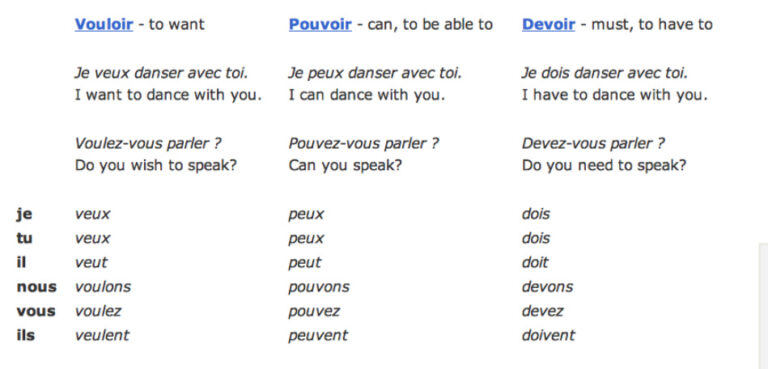The French verb pouvoir means « to be able [to do something], » or more simply, « can » and « may. » It’s an extremely common verb in French and has an irregular conjugation that can be tricky for non-native speakers.
Ainsi, What does faire in French mean? Faire is one of the most common and useful French verbs and has irregular conjugations in just about every tense and mood. Faire literally means « to do » or « to make, » but it’s also found in many idiomatic expressions and is the key to the causative construction.
Or, What is the difference between Je Puis and Je peux?
Je peux becomes Puis-je (Can I?) in questions where the subject and verb are inverted (we can’t write or say Peux-je). This form of the verb comes from an older style of conjugating the verb pouvoir.
What tense is Je peux? Pouvoir Conjugation in the Present Tense (le présent)
| Je peux | I can |
|---|---|
| Il/elle peut | He/she/it can |
| Nous pouvons | We can |
| Vous pouvez | You can (formal/plural) |
| Ils/elles peuvent | They can |
• 4 mars 2021
Ensuite, What is the difference between JE Pourrais and Je Pouvais?
The best way to explain it would be: ‘I could see her from my balcony’. this sentence expresses something that happened in the past, so you would say: « Je pouvais la voir (depuis/de) mon balcon. » However, if ‘could’ is conditional on another action, or hypothetical then ‘pourrais’ is used.
What does Du mean French?
The French partitives of du, de la, de l’ and des mean ‘some’ and ‘any’ in English.
How do you say hi what are u doing in French?
Yeah, hi, what are you doing? Hé, qu’est-ce que tu fais ?
How do you use je fais?
While it’s commonly used to express either “to do” or “to make,” the circumstances in which these verbs can be used varies a lot between French and English. While you might use faire to describe doing the food shopping—je fais les courses—you might also use it to say that you’re riding a bike—je fais du vélo.
What does the French word peu mean?
: a trifle : nothing much.
Do French people say puis je?
In today’s modern spoken French however, “puis-je” sounds very formal: instead, people use “pourrais-je”, although it’s still very formal, so we would only use it in certain situations, like…
Is Vouloir etre or avoir?
The French verb vouloir means « to want » or « to wish. » It is one of the 10 most common French verbs and you will use it just as much as avoir and être.
Do people say puis je?
Asking a question in French using inversion with je is no longer common. Je in inversion is mostly used in formal literature and deep introspection, and sometimes with “puis-je”. If you have to ask yourself something in French, use “est-ce que je”!
How do you use puis in French?
Note that puis is generally only used to « join sentences together » in this way. So for example, you can’t put puis at the end of a sentence. And it doesn’t make sense to say qu’est qu’il a fait puis? for « what did he do then? ».
How do you use Vouloir in French?
The French verb vouloir means « to want » or « to wish. » It is one of the 10 most common French verbs and you will use it just as much as avoir and être .
For example:
- Je voudrais du thé.
- Voudriez-vous venir avec nous ? – Would you like to come with us?
- Je voudrais ceci.
- Je voudrais faire un enfant.
What is the difference between JE and J AI in French?
J’ai = I have. Je suis = I am. That said, not always when you would say « I am » in English, is the French translation Je suis. The French say, e.g., I have 20 years (j’ai 20 ans).
What is the contraction of de la da de la du de l?
Related lessons
| Preposition + article | Contraction | Example |
|---|---|---|
| de + le | du | Je viens du marché . (le marché /market) |
| de + les | des | Je viens des Pays-Bas. (Les Pays-Bas / The Netherlands) |
| These don’t contract | ||
| à + la | Je vais à la poste (the post office) |
• 11 mai 2022
Is LA feminine in French?
le, la and les are the french equivalents for the. As French makes a distinction between « masculine and feminine objects », people use le for masculine things/persons and la for feminine things/persons. However, in the plural, only les is used whatever the gender is.
Is De La feminine or masculine in French?
French partitive articles
+ There are three singular articles: Masculine: du. Feminine: de la.
How do you say OK in French?
10 ways to say OK in French
- 10 ways to say OK in French.
- OK.
- D’accord (Standard French)
- D’acc / Dac-o-dac (Cool French)
- Pas de problème / Pas de soucis.
- Ça marche / Ça roule (slang-ish French)
- Pas grave.
- Bien / Bon.
How do you say I miss you in French?
How to Say « I Miss You » in French
- « Je Te Manque » or « Tu Me Manques »
- The Verb and Subject Must Agree.
- Watch the Middle Pronoun.
- Manquer Without Pronouns.
- More Meanings for Manquer.
What is the meaning of Que fais tu?
Que fais-tu ? : What are you doing?
What is fait used for in French?
It’s the equivalent of saying something like « in fact, » « as a matter of fact » or « actually » in English.
Is it je fais or je faire?
Faire Conjugation in the Present Tense
| Singular | Plural | |
|---|---|---|
| Je fais | I make/do | We make/do |
| Tu fais | You make/do | You make/do |
| Il fait | He makes/does | They make/do |
| Elle fait | She makes/does | They make/do |
• 4 janv. 2020
Is Aller irregular?
Alright, « aller » (to go) is another irregular verb. It’s often mistaken for a regular verb, because of its ending, but it’s not! It’s very irregular. And it’s also a super common verb.


